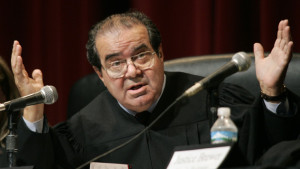The Time Justice Scalia Caught Me Out

The death last weekend of Supreme Court Justice Antonin Scalia brought to mind the time when he turned over a stone in the legal rockpile only to reveal an awkward bit of half-smart maneuvering by me — though until now my name was never publicly associated with it.
The case involved the Equal Access to Justice Act (EAJA), a law that allows small businesses and individuals opposing the federal government to recover some of their attorney fees if they prevail and if the government’s position was not “substantially justified.” Promptly, a lot of ink was spilled over the meaning of “substantially justified.”
I wandered into the situation on behalf of my father, who was a fervent advocate on behalf of small businesses — he thought they are the bedrock of democracy, innovation, and most of what is good in the world. (For then-Sen. John Kerry’s tribute to The Old Man, go here.) EAJA was up for reenactment and The Old Man hoped to have Congress lower the barrier to fee recovery by softening the term “substantially justified.”
Nominally representing a few small business groups — but really representing my father — I testified before Congress with this message and pressed it in meetings with committee staff. There was no way, I learned, that Congress would change the statutory wording.
So I moved to Plan B. How about the committee report that would issue with the legislation? Maybe the report could embrace the softer, more generous interpretation of “substantially justified”? Ah. That was easier. In went the language. The Old Man was mollified. Better half a loaf, right?
Shortly later, the U.S. Court of Appeals for the District of Columbia Circuit issued an EAJA decision. In a separate concurrence, then-Judge Scalia wrote with withering contempt of the lonesome bit of legislative history I had secured (Hirschey v. Federal Energy Regulatory Comm’n, 777 F.2d 1), comparing its weight to that of an “equivalently unreasoned law review article”:
“I frankly doubt,” he wrote, “that it is ever reasonable to assume that the details, as opposed to the broad outlines of purpose, set forth in a committee report come to the attention of, much less are approved by, the house which enacts the committee’s bill. And I think it time for courts to become concerned about the fact that routine deference to the detail of committee reports, and the predictable expansion in that detail which routine deference has produced, are converting a system of judicial construction into a system of committee-staff prescription.”
Ouch. That the judge was dead right didn’t make the experience any less mortifying. I felt so . . . violated!
What about all the other stray bits of unwarranted legislative history out there? Of all gratuitous legislative history accompanying all the obscure statutes produced by all the legislative bodies in the world, why did Scalia have to choose mine to pick on?
Over nearly the next 30 years, Scalia continue to fulminate against relying on legislative history that can’t be tied to the legislators actually voting on a bill. In all of those cases that I didn’t work on, I agreed with him.
How did my father take the episode? With a shrug. He was in it for the long haul. We’ll get ’em next time, he said.
Following your exploits with great admiration.